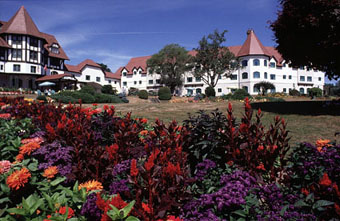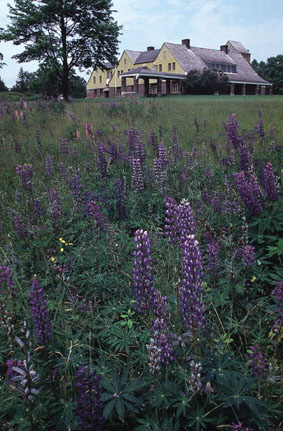
The
Gulf of Maine Summit will be held in the historic Algonquin Hotel
overlooking Passamoquoddy Bay.

Sir William Van Horn’s former home near St. Andrews
Photos: Communications New Brunswick
|
|
Summit
workshops to emphasize
sound
tourism practices
Printer
friendly format
By Andi Rierden, Editor
A fisheries biologist I know, who had worked for many years at the Huntsman Marine Research Centre in St. Andrews, New Brunswick, recently lamented to me how much he missed the town and its “brilliant spirit.” After several memorable stays in St. Andrews, I can certainly sympathize. Officially known as St. Andrews-by-the-Sea, this lovely coastal hamlet just off Highway 1, near the Maine border, is a Canadian National Historic District, possessing architectural charm, artisan shops, an arts and nature center, whale watching and seakayaking tours, a stunning public garden and good walking trails.
Down the steep hill from the stately Algonquin Hotel, the shady streets open on a vista of Passamaquoddy Bay, named for the Native People who settled the land. Upriver is St. Croix Island, where Champlain and Sieur de Monts established the first Acadian post in 1604. To the east is the imposing former summer home of railway tycoon Sir William Van Horn, accessible only at low tide. Beyond the point, is the entrance of the Bay of Fundy, and Campobello Island where Franklin Delano Roosevelt spent his summers.
The town is also a mecca for marine science research—the Huntsman and International Atlantic Salmon Foundation attract researchers and students from around the world. Given this mix of history, science, art, nature and regional traditions, St. Andrews is a prime location to demonstrate the principles and benefits of a new level of sustainable tourism.
Leading
up to the Gulf of Maine Summit, which will be held in St. Andrews
in late October [see Calendar], tour
operators and other interested individuals around the Gulf of Maine
will have the opportunity to be part of a two-day event to explore
ways to develop sustainable tourism practices in the Gulf of Maine.
The so-called “geotourism initiative” grew out of a workshop
held in Kittery, Maine, last fall sponsored by the Gulf of Maine
Council. The session brought together representatives from the tourist
industry, community, government and non-government organizations
and resulted in the formation of a Geotourism Task Force to move
the idea forward.
Theresa Torrent-Ellis, senior planner at the Maine State Planning Office and co-ordinator of the initiative, said tourism that relies upon a ‘sense of place’ has become increasingly important to regional traditions and economies throughout the Gulf of Maine, yet has not been seriously examined beyond the state or provincial level.
“If tourist operators are just looking at numbers of visitors, we quickly degrade that which we are asking people to come and see,” she said. “A region-wide effort is key to conserving the natural resources that are the attraction to this region and to maintaining the region’s cultural integrity. And research shows that the tourist who is looking for a quality nature-based experience is also looking for a quality food, culture and arts experience and that they are willing to pay more for these experiences.”
At the fall workshop, she added, participants recommended that the term “geotourism” be adopted for Gulf of Maine tourism initiatives, based on the work of Jonathan Tourtellot, a travel editor for National Geographic magazine. Tourtellot will give the keynote address at a geotourism fair and festival on October 27 at the Algonquin Hotel.
The term geotourism goes beyond the nature-based or ecotourism model by encompassing a region’s art, culture and history as well. Critics have long complained that ecotourism, initiated in the early 1990s, is an often vague and abused term that can actually harm natural resources. Tourism to the world's biodiversity hot spots, for example, increased by more than 100 percent between 1990 and 2000, reports Conservation International. As a result, heavy traffic and unsustainable practices are often ruining elements that make a destination unique and worth visiting.
But when tourism is managed well, Tourtellot says, it can actually save and protect its special qualities. A few years back, Tourtellot and his wife coined the term “geotourism,” defining it as “a means to sustain or enhance the geographical character of a place—its environment, culture, aesthetics, heritage, and the well-being of its residents.” Geotourists, Tourtellot says, spend their money in ways that help maintain and sometimes enhance the geographical diversity and distinctiveness of the place they are visiting.
If handled well, he says, geotourism can preserve the best things a destination has to offer: wildlife habitats, historic districts, beautiful scenery, a style of music or a local cuisine.
Tourtellot has cited the Monterey Bay Aquarium in California as a good example of geotourism. Built in a restored cannery building within a historic district, the aquarium attracts 1.8 million visitors each year. Visitors leave with a good sense of the diversity and fragility of sea life off the coast of California. As a result, the aquarium played a major role in the development of the Monterey Bay National Marine Sanctuary.
An example here in the Gulf of Maine is the Downeast Heritage Center in Calais, Maine. Opened last fall, the center brings a new standard of appreciation to a part of the state that often doesn’t receive it. Located in the old Calais Press Building, on the bank of the St. Croix River, the center highlights regional Native and Euroamerican history, the local fishing industry and the expansive Moosehorn National Wildlife Refuge and coastal parks.
The geotourism activities will begin Monday, October 26, with a workshop led by Bruce Smith, the owner of Seascape Kayak in St. Andrews and Aaron Frederick of Rippleffect, in Portland, Maine, to look at successful models of geotourism interpretation.
On
Tuesday, David Vail, an economist at Bowdoin College in Maine and
an international sustainable tourism expert, and Brian Hicks, coordinator
of the Tourism Industry Association of Nova Scotia, will lead a
workshop exploring the concept of a regional certification program
for tour operators in the Gulf of Maine.
That evening a geotourism fair and festival will showcase conservation and culturally minded tourism businesses, opening with Tourtellot’s keynote presentation.
To become a part of the Geotourism Taskforce or to attend the workshops, the Summit, or both, contact Patricia King, summit co-ordinator, at 902-876-1160 or pattyfsrs@auracom.com.
|

